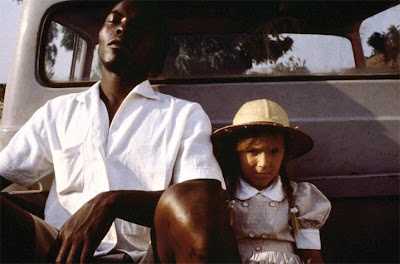Chocolat - Claire Denis
By Moira Sullivan
 |
| Isaach De Bankolé and Cécile Ducasse in Chocolat. |
The League of Nations mandated 91% of Cameroun to France
after World War 1. It was not until 1960 that it became independent. Clair
Denis' film Chocolat concerns a young
French girl’s upbringing in Cameroun during the mandate. She lives on a
manor where her father Marc Dalens (François Cluzet) is a captain in a colonial
outpost and her mother Aimée Dalens (Giulia Boschi) is head of the household. Assisting
her are black servants, and the most prominent and dutiful one is Protée (Isaach De Bankolé). His upbringing in the Christian
church and his pride as a black man have contributed to his impeccable sense of
morality, and according to de Bankolé who plays him, the hope for the future of
Africa.
The grown France (Mireille Perrier) in many ways like Claire
Denis who grew up in Dijbouti, returns in the beginning of the film to
Cameroun. She is alone and observes a father and his son swimming on the beach.
Later the father, Mungo, insists that he give her a ride to the bus stop at
least. Then in a long flashback we
are invited into France’s (appropriately named) character and her early life; this is the history of France in Cameroun.
Claire Denis is a master at elliptical editing, avoidance of
music in many scenes, and the absence of action in scenes where life is as it
is often uneventful and calm. Everything in the film suggests from our
indoctrination from dramatic films that something horrible is going to happen,
because it is so calm. Instead of overt violence, the kind of violence shown in
the film is subtle, the language of the colonizers against Africa.
Daily life consists of Marc going to his military post, and
coming home in the evening to be with his family. During the day France (Cécile Ducasse in her one and only role) accompanies
Protée on his goings about who is a kind and loving guardian to her. At the
same time there is a repressed tension between Aimée and Protée whose names
almost seem like they belong together. However the racial lines cannot be
crossed except as colonizer and colonized.
When Marc is away, Protée becomes the man of the house, and in one scene Aimée commands him to sit in front of the door to her bedroom with rifle in hand to frighten off a prowling hyena. He is clearly disturbed by the dissolution of private and public space in being forced to sit as she sleeps.
When Marc is away, Protée becomes the man of the house, and in one scene Aimée commands him to sit in front of the door to her bedroom with rifle in hand to frighten off a prowling hyena. He is clearly disturbed by the dissolution of private and public space in being forced to sit as she sleeps.
One day a plane flies over the country manor and not long
after a pilot, his first mate, an officer and his wife and the gruff coffee
plantation owner Joseph Delpich
(Jacques
Denis), and his servant who is his concubine, arrive by foot. The
stranded visitors will need to stay for a while with the Dalens until a landing
strip is built for their takeoff and engine parts arrive to repair the plane
after its rough landing.
Their presence in the house brings the colonial oppression
of Cameroun to the surface more overtly. Whereas the Dalens’ have treated the
servants benevolently, the new guests treat them as inferior beings.
Friends of
the Dalens come visiting when the airstrip is to be built and bring with them laborers,
including the young white French Luc (Jean-Claude Adelin). Not long after that Luc
tries to prey on Aimée Dalens. Protée is aware of this and throws him out of
the house where he has taken root on the porch. When Aimée then makes advances
towards Protée as gratitude for standing up to the oafish Luc he stands her up
to shake sense into her and also to make it clear that there is a boundary
between them. For this he is banished from the house and put to work in the
garage.
France visits him and he is longer is the kind guardian she
knew.
The colonial presence in Africa has often been historically glamorized
in film but Chocolate shows how the French were tolerated and despised. When the
visiting officer’s wife takes ill Marc sends for medical assistance. The
assistant is picked up at a school were several men are gathered. This raises
Marc’s suspicion but Protée claims they are only talking. Yet it seems like rebellion
is brewing. It must be another four years before the country became independent
through armed struggle.
© 2013 - Moira Sullivan - Air Date: 08/07/13
Movie Magazine International
Movie Magazine International
Comments
Post a Comment